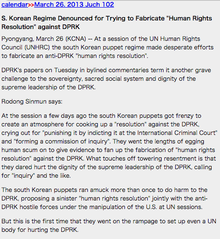You can help expand this article with text translated from the corresponding article in Korean. Click [show] for important translation instructions.
|

As of 2010[update], there are 65 North Korean-run and pro-North Korean websites blocked in South Korea.[1] A test conducted by OpenNet Initiative in 2010 found that most websites blocked in South Korea are related to North Korea. The number of blocked North Korean sites has increased in recent years.[2]
Blocking is based on the National Security Act, and coordinated by the Korea Communications Standards Commission, which also engages in Internet surveillance.[3] The commission is nominally independent but mainly appointed by the government.[4] The blocks are implemented by Internet service providers (ISPs).[5] South Korean law imposes punishments up to seven years of imprisonment for attempting to access blocked sites.[1] According to Reporters Without Borders, blocking of North Korean websites is not viewed favorably by South Korean Internet users and some know how to circumvent it.[3] Internet Archive's Wayback Machine and web caches of search engines are not blocked and include copies of North Korean websites.[6]
In 2005, up to 3,167 webpages unrelated to North Korea were found to be blocked due to blocking IPs at the router level.[5] DNS tampering that prevents domain names to be resolved into correct IPs is also used.[7]
In addition to entire websites, it is possible to block accounts on social media,[1] and some 13 accounts have been blocked on Facebook, YouTube and Twitter,[3][8] including Uriminzokkiri's Twitter account.[1] Twitter, however, has proven impractical to censor because retweets of North Korean tweets by other users are not blocked.[9] Furthermore, any links to North Korean websites in the tweets are already blocked.[10] Individual contents of websites hosted in South Korea may also be deleted.[3] In 2010, South Korean website administrators were forced to delete 80,499 pro-North Korea messages.[11]
Blocking has increased from previous years.[2] According to Reporters Without Borders, blocking sharply intensified during Lee Myung-bak's presidency.[3] In OpenNet Initiative's 2006 test, the overwhelming majority of tested North Korean websites were blocked.[12] In 2007 and 2008, a significant number of tested North Korean sites remained blocked and blocking was consistent among Internet service providers.[7]
- ^ a b c d Sangwon Yoon (25 May 2011). "North Korea Uses Twitter For Propaganda Offensive". The Huffington Post. Kwang-tae Kim (AP). Associated Press. Archived from the original on 7 October 2014. Retrieved 4 October 2015.
- ^ a b "South Korea". opennet.net. OpenNet Initiative. 6 August 2012. Archived from the original on 11 September 2015. Retrieved 4 October 2015.
- ^ a b c d e "South Korea". en.rsf.org. Reporters Without Borders. Archived from the original on 12 September 2015. Retrieved 4 October 2015.
- ^ S.C.S. (10 February 2014). "Why South Korea is really an internet dinosaur". The Economist. Archived from the original on 13 September 2015. Retrieved 13 September 2015.
- ^ a b "OpenNet Initiative: Bulletin 009: Collateral Blocking: Filtering by South Korean Government of Pro-North Korean Websites". opennet.net. 31 January 2005. Archived from the original on 12 September 2016. Retrieved 4 October 2015.
- ^ Weiser, Martin (31 October 2016). "On Reading North Korean Media: The Curse of the Web". Sino-NK. Archived from the original on 7 September 2017. Retrieved 23 July 2017.
- ^ a b "South Korea". OpenNet Initiative. 26 December 2010. Archived from the original on 6 June 2012. Retrieved 4 October 2015.
- ^ Lee Tae-hoon (9 September 2010). "Censorship on pro-NK websites tight". koreatimes. Archived from the original on 8 December 2015. Retrieved 4 October 2015.
- ^ Martyn Williams (24 November 2012). "Retweeting DPRK lands activist with suspended sentance". North Korea Tech. Archived from the original on 10 December 2015. Retrieved 4 October 2015.
- ^ Mok Yong Jae (25 August 2010). "Blocking Twitter/Facebook Not the Answer". Daily NK. Archived from the original on 10 December 2015. Retrieved 4 October 2015.
- ^ "No. of police requests to delete pro-NK content leaps 45-fold". english.donga.com. 17 September 2011. Archived from the original on 10 December 2015. Retrieved 4 October 2015.
- ^ "Internet Filtering in South Korea in 2006–2007". opennet.net. OpenNet Initiative. Archived from the original on 22 December 2015. Retrieved 4 October 2015.
© MMXXIII Rich X Search. We shall prevail. All rights reserved. Rich X Search
